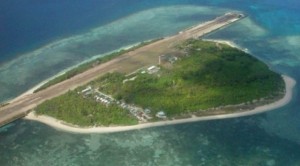UN tribunal called a ‘leveling ground’ in rows between small and powerful nations

This undated photo handout released by the Kayalaan Municipal office on July 13, 2011 shows the island of Kalayaan, which means “Freedom” in the Filipino language, that was created in 1978 mainly to assert the Philippines’ claim to the disputed territory in the Spratlys, a chain of islets in the South China Sea. AFP FILE PHOTO
BRUSSELS, Belgium—A future ruling by a United Nations body on the territorial row in the West Philippine Sea, that part of the South China Sea which Manila claims to be within its exclusive economic zone, would guide the Philippines on how to negotiate with China, according to a maritime security expert.
While frowned upon by Chinese commentators, the Philippines’ filing of a case against China in the International Tribunal on the Law of the Sea was not a “bad idea,” Jane Chan Git Yin said.
After all, international law acts as a “leveling ground” for puny countries dealing with bigger neighbors, said Yin, research fellow-coordinator of the maritime security program at Nanyang Technological University.
“I don’t think it’s a bad idea to have the tribunal rule on the application of Unclos (UN Convention on the Law of the Sea),” she said in an interview after a forum. “The fact of the matter is that Unclos is intentionally vague on some of these issues.’’
Yin spoke at a forum on European Union-Asia cooperation on maritime security organized by the Konrad Adenauer Stiftung on September 18 here, which was covered by journalists from Asian countries.
But more importantly, any ruling by the tribunal would serve as a guide for future negotiations between the Philippines and China, Yin said.
“If you say it’s a good idea, it may still be because it will give you some clarity as to how you can proceed with your negotiation with China,” she said.
“To have this tribunal give some guidance as to how some of these provisions can be interpreted could be potentially used when you’re negotiating with China. The fact of the matter is that they may not rule in favor of the Philippines at all,’’ she added.
On March 30, Manila filed a memorandum in the tribunal, asking it to rule on China’s claims over most of the South China Sea.
The tribunal has asked Beijing to respond to the memorandum, but the latter has balked at this.
Shortly before the filing of the memorandum, China blockaded a Philippine resupply mission to Ayungin Shoal in late March. It seized Scarborough Shoal in 2012.
China claims 90 percent of the 1.35-million-square-mile South China Sea, while the Philippines, Vietnam, Malaysia and Brunei, and non-Asean member Taiwan claim parts of it.
In a separate briefing for the Asian journalists, Michael Reiterer, senior adviser at the Asia Pacific Department of the European External Action Service, acknowledged the key role that the Association of Southeast Asian Nations (Asean) could play as a forum for a dialogue with China.
Otherwise, an Asean that is not solid would give China more leeway to deal with each claimant country on a one-on-one basis, said Reiterer.
“If Asean is not getting back together, it offers China or any other country the possibility to deal with others one to one. And Asean solidarity, you find it any paper, but you have to live it,” he said in response to a question.
Reiterer recalled instances when Asean failed to craft a communiqué on the maritime dispute with China for lack of consensus.
“If you have a structure, a security structure where you could discuss these things in a multilateral setting, it would be easier for the Philippines, for Vietnam. You’re not sitting one to one. That’s a weakness,” he said.
“These structures help. The weaker you are, the more protection you need from multilateralism. It takes individual pressure off your shoulder. That’s probably missing in Asia right now,” he added.
RELATED STORY
Philippines suspends work on South China Sea military airstrip
For comprehensive coverage, in-depth analysis, visit our special page for West Philippine Sea updates. Stay informed with articles, videos, and expert opinions.